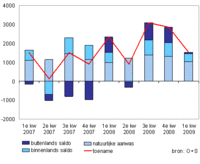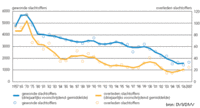Difference between revisions of "Number of people in Amsterdam"
| Line 9: | Line 9: | ||
Amsterdam is getting more and more diverse. The people of Amsterdam currently 51% autochtoon, 35% non Western allocthtoon, and 14% western allochtoon. <br> | Amsterdam is getting more and more diverse. The people of Amsterdam currently 51% autochtoon, 35% non Western allocthtoon, and 14% western allochtoon. <br> | ||
[[Image:2009 nieuws bevolking 1kw 4.gif |200px]] | [[Image:2009 nieuws bevolking 1kw 4.gif |200px]]<br> <br> | ||
Traffic. <br> [[Image:2008 jaarboek.gif|200px]] | Traffic. <br> [[Image:2008 jaarboek.gif|200px]]<br> <br> | ||
The elderly people are not offten subject to traffic accidents (see below) but the impact of the accident is heavier (dead rate is higher).<br> | The elderly people are not offten subject to traffic accidents (see below) but the impact of the accident is heavier (dead rate is higher). <br> | ||
[[Image:Slachtoffers per groep.gif|200px]] | [[Image:Slachtoffers per groep.gif|200px]]<br> <br> | ||
Increase in Foreigners. | Increase in Foreigners. | ||
Revision as of 20:46, 15 October 2009
Description:
In the first quarter of 2009 the population of Amsterdam increased with 1500 people. In the total of 2008 Amsterdam increased with 9000 people. At the beginning of 2009 the official number of people is 756.237. During a average day a little less then 200.000 people come to Amsterdam to work. On a yearly basis 5 million tourists visit Amsterdam. It is clear that Amsterdam is changing; the example above shows the rise of the amount of people in the city. This change in the people of Amsterdam will have impact on the hospitals in Amsterdam.
Enablers:
More houses in Amsterdam. The number of houses (384.323) will increase to approximately 445.002 in 2030. The number of bought houses increased from 11% (1995) to 26% (2008). People who buy a house might have a different profile then people who e.g. rent a house.
People are getting older. The average age of people in Amsterdam is in 2008 37 years. In 2003 this will probably have increased to 40 years.
Amsterdam is getting more and more diverse. The people of Amsterdam currently 51% autochtoon, 35% non Western allocthtoon, and 14% western allochtoon.

Traffic.

The elderly people are not offten subject to traffic accidents (see below) but the impact of the accident is heavier (dead rate is higher).

Increase in Foreigners. More foreigners in Amsterdam (part time workers, expats and tourists.)
Public transport is improving. The central station of Amsterdam is being used by 280.000 on a daily basis. Within 5 years this will increase to 350.000. This will make it the busiest station in the Netherlands. The station in Amsterdam Zuid will increase, as the ‘zuid-as’ is, and therefore will increase within 15 – 20 years time to the size of Utrecht Central.
More students. Increase demand for students. More flexible building (student containers, student boats) will lead to more people
Others. Office building are changed into housing; will lead to a increase in people. Increase in people will lead to higher ground price (hospitals outside – Ring?)
Inhibitors:
Increase in house price. The increasing housing price will ‘force’ more people to leave Amsterdam
House prices is increasing (slightly) and this will decrease the number of people in Amsterdam. Because of the increasing housing price more people will leave Amsterdam and come back to work in Amsterdam. This will increase the traffic problems. http://en.wikipedia.org/wiki/Traffic_congestion
Increase in more sustainable environment.
Trend towards more healthy environment will push people to healthier areas.
Decrease of traffic problems New solutions for the traffic problems are being offered http://www.rijkswaterstaat.nl/images/Flyer%20Tweede%20Coentunnel%20-%20Westrandweg_tcm174-268986.pdf
Paradigms:
To be done
Experts:
Office of Research and Statistics (http://www.os.amsterdam.nl/)
Timing:
The application below shows a good insight in the economics of Amsterdam. http://www.amsterdamconjunctuur.nl/OS.Conjunctuur/Template.aspx?RID=9&Mode=live [edit] Web Resources: http://www.os.amsterdam.nl/